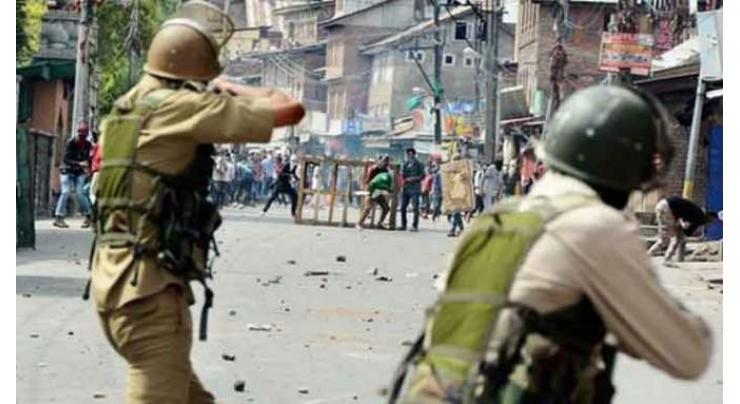
Roundtable Kashmir Moot Lambastes India For "Rising State Repression In IIOJK"
Fahad Shabbir (@FahadShabbir) Published January 21, 2022 | 05:28 PM

The India Study Centre (ISC) at the Islamabad-based Institute of Strategic Studies, (ISSI), held a roundtable on "Rising State Repression in IIOJK" in collaboration with the Jammu and Kashmir Liberation Cell, Government of Azad Jammu and Kashmir late Thursday
ISLAMABAD, (UrduPoint / Pakistan Point News - 21st Jan, 2022 ) :The India Study Centre (ISC) at the Islamabad-based Institute of Strategic Studies, (ISSI), held a roundtable on "Rising State Repression in IIOJK" in collaboration with the Jammu and Kashmir Liberation Cell, Government of Azad Jammu and Kashmir late Thursday.
Welcoming the guests, Director ISC Dr. Saif Malik said that ISC is Pakistan's first ever India focused centre that specifically looks into the issue of Jammu and Kashmir.
He said that August 5, 2019 brought many changes for the people of Indian Illegally Occupied Jammu and Kashmir (IIOJ&K) and has made the lives of people more miserable. In fact, August 5 is Kashmir's 9/11.
Referring to the unabated human rights abuses, he wondered how the world that calls itself "civilised" can be sensitised about the situation in IIOJ&K.
Ershad Mahmud, Director General Jammu and Kashmir Liberation Cell was of the view that the human rights conditions in IIOJK are gradually attracting significant international attention.
Referring to the report by an international law firm Stoke White and other reports by human rights groups, Ershad said that Amit Shah and Ajeet Doval are key architects of present Kashmir policy that completely rely on excessive use of power and repression to achieve political goals.
He also highlighted the fact that by arresting noted Kashmiri journalists and human rights activists, India is clearly signalling that there is no space for any sort of activism.
Senator Zarqa Suharwardi said that the international community is very much aware of the situation in IIOJK but that is not enough.
She said that under draconian laws that India has imposed in IIOJ&K, young boys are picked up from their homes and taken to far-flung areas without informing their parents and family members.
The same is being done with the bodies of shaheeds which are forcefully taken away from families.
Alaf Hussain Wani, Chairman, Kashmir Institute of International Relations suggested that there is much literature available on the human rights violations in IIOJ&K which needs to be disseminated.
Barrister Nida Salam condemned the atrocities and violation of fundamental human rights taking place in IIOJ&K.
She said that enforced disappearance, torture and rape are against international laws, commitments and obligations and India is in breach of all of these.
Raja Muhammad Sajjad, Director Jammu and Kashmir Liberation Cell highlighted three phases in the history of the Kashmir conflict i-e. 1947-1989, 1989 - 2019 and lastly the phase that started on August 5, 2019. This last phase, starting from August 5, 2019 has brought with it many difficulties for the people of IIOJ&K as India has launched an onslaught on Kashmiri land, culture, language and civilisation.
He suggested that cases against Indian atrocities should be initiated in the courts of Azad Jammu and Kashmir which will then help in taking the issue to international courts.
During the course of the discussion, Iftikhar Gillani said that ICRC used to meet the Kashmiri prisoners but now that practice has been discontinued by it.
He stressed the need for ICRC to resume its engagement with Kashmiris imprisoned within IIOJK or in other parts of India.
Towards the end of the event, Ershad Mahmd once again stressed the fact that slow genocide is taking place in IIOJ&K and the world needs to take note of it.
Related Topics
Recent Stories

Azad Jammu Kashmir Prime Minister Chaudhry Anwar ul Haq condoles over the demise ..

Senior Army Commanders visit families of customs' martyrs to condole

Poland-Pakistan corporation established on solid foundations: Polish envoy

Chairman Senate passes ruling to constitute Special Committee of Upper House


Stocks fall as tech shares sink, US economy slows

Honda announces US$11 bn EV battery and vehicle plant in Canada

All AJK Inter-varsity Speech Competition urges UNO to ensure early grant of righ ..

AJK CEC calls on President Sultan Chaudhry

Assistant Secretary General of UNDP, Director of Regional Bureau for Asia & Paci ..

Portugal marks 50 years of democracy with far right on the rise

IHC suspends notification regarding cut in prices of 'naan & roti'
More Stories From Kashmir
-

Azad Jammu Kashmir Prime Minister Chaudhry Anwar ul Haq condoles over the demise of an ex-AJK Minist ..
14 minutes ago -

AJK observes World Earth Day with a call to action on plastic pollution
3 days ago -

AJK PM Marks One Year in Office, Vows to Continue Serving with Zeal
5 days ago -

Mehbooba Mufti vows to fight India's hostile policy
5 days ago -

Azad Jammu Kashmir Prime Minister Chaudhry Anwar ul Haq Pays visit to special Advisor's residence
5 days ago -

Mirpur Police arrest 68 suspects of food outlet attack
6 days ago
-

Modi govt broken all records of oppression to win elections: President AJK
6 days ago -

AJK business forum proposes measures for industrial growth
7 days ago -

MoU signed for skilled manpower in AJK: PM lauds initiative
7 days ago -

Fresh wave of freedom struggle gains momentum in IIOJK
7 days ago -

JKNF clarifies Muneer Khan's political shift
7 days ago -

AJK gov’t initiates efforts to revive sick industrial units
8 days ago











